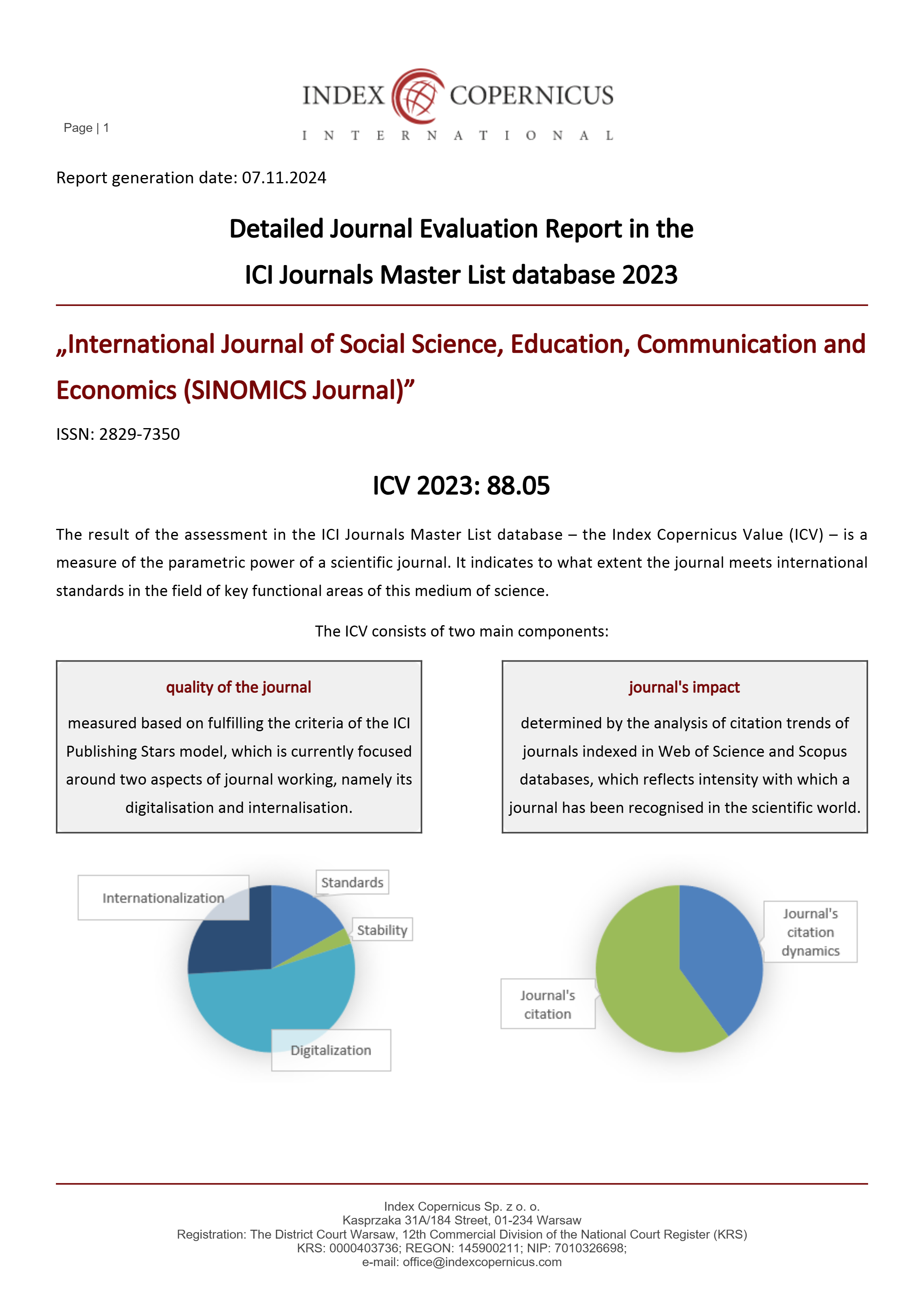Technology Integration in Economic Education
Main Article Content
Alhidayatullah
R. Madhakomala
The incorporation of technology in economic education yields numerous advantages, such as enhanced accessibility, more engaging instruction, and the cultivation of data analytic competencies pertinent to the professional realm. Numerous studies address the incorporation of technology in education; nevertheless, research focusing on the integration of technology in economic education remains few. This study is to examine and elucidate the use of technology in economic education. The employed research methodology was quantitative, utilizing a sample of 142 participants, comprising lecturers and students from the 3rd, 5th, and 7th semesters of the Faculty of Economics at the University of Muhammadiyah Sukabumi. The data gathering method is a questionnaire disseminated to participants via Google Forms, while the data analysis employs multiple linear regression. The study's results indicate a substantial favorable impact of technology integration in economic education, with an influence of 67%. This research contributes by providing references in education, particularly with the incorporation of technology in economics instruction.
Abed, E. K. (2019). Electronic learning and its benefits in education. EURASIA Journal of Mathematics, Science and Technology Education, 15(3), em1672.
Aktan, A. E., Bartoli, I., & Karaman, S. G. (2019). Technology leveraging for infrastructure asset management: Challenges and opportunities. Frontiers in Built Environment, 5, 61.
Aleksandrova, E., Vinogradova, V., & Tokunova, G. (2019). Integration of digital technologies in the field of construction in the Russian Federation. Engineering Management in Production and Services, 11(3), 38-47.
Alghamdi, J., & Holland, C. (2020). A comparative analysis of policies, strategies and programmes for information and communication technology integration in education in the Kingdom of Saudi Arabia and the republic of Ireland. Education and Information Technologies, 25(6), 4721-4745.
Alhidayatullah, A., Amal, M. K., Aziz, M. A., & Anjani, C. P. (2024). Risk Management Strategy in Supply Chain Management. SMART: Management Journal, 4(2), 67-72.
Atabek, O. (2020). Experienced educators’ suggestions for solutions to the challenges to technology integration. Education and Information Technologies, 25(6), 5669-5685.
Aziz, M. A. (2023). Improving Mses Performance Through Competitive Advantage: A Study On Sukabumi City MSEs. Berajah Journal, 3(4), 661-674.
Bahrini, R., & Qaffas, A. A. (2019). Impact of information and communication technology on economic growth: Evidence from developing countries. Economies, 7(1), 21.
Benos, N., & Zotou, S. (2014). Education and economic growth: A meta-regression analysis. World Development, 64, 669-689.
Bhat, R. A. (2023). The impact of technology integration on student learning outcomes: A comparative study. International Journal of Social Science, Educational, Economics, Agriculture Research and Technology (IJSET), 2(9), 592-596.
Bower, M. (2017). Technology integration as an educational imperative. In Design of Technology-Enhanced Learning (pp. 1-16). Emerald Publishing Limited.
Chiu, M. S. (2020). Exploring models for increasing the effects of school information and communication technology use on learning outcomes through outside-school use and socioeconomic status mediation: The Ecological Techno-Process. Educational Technology Research and Development, 68(1), 413-436.
Criollo-C, S., Guerrero-Arias, A., Jaramillo-Alcázar, Á., & Luján-Mora, S. (2021). Mobile learning technologies for education: Benefits and pending issues. Applied Sciences, 11(9), 4111.
Davies, R. S., & West, R. E. (2014). Technology integration in schools. Handbook of research on educational communications and technology, 841-853.
De Sordi, J. O. (2024). Qualitative Research Methods In Business Techniques for Data Collection and Analysis.
Donou-Adonsou, F. (2019). Technology, education, and economic growth in Sub-Saharan Africa. Telecommunications policy, 43(4), 353-360.
Dotong, C. I., De Castro, E. L., Dolot, J. A., & Prenda, M. (2016). Barriers for educational technology integration in contemporary classroom environment. Asia Pacific Journal of Education, Arts and Sciences, 3(2), 13-20.
Harrell, S., & Bynum, Y. (2018). Factors affecting technology integration in the classroom. Alabama Journal of Educational Leadership, 5, 12-18.
Jayadi, U., Sayidah, N., & Ady, S. U. Psychology of Strategic Leadership: Unveiling Cognitive Biases and Emotional Influence. Morfai Journal, 4(4), 1216–1224. https://doi.org/10.54443/morfai.v4i4.2297
Kalogiannidis, S., Savvidou, S., Konteos, G., & Papaevangelou, O. (2022, July). Impact of integration of technology on teaching and learning in the primary schools classroom on economic growth. In International Conference on Applied Economics (pp. 417-432). Cham: Springer International Publishing.
Kecheng, S. (2023). The Integration and Role of Digital Technology in the Teaching of Local-Featured Economics Courses in Secondary Schools. Academic Journal of Business & Management, 5(1), 35-40.
Lin, J., Yu, Z., Wei, Y. D., & Wang, M. (2017). Internet access, spillover and regional development in China. Sustainability, 9(6), 946.
Nelson, R. R. (2005). Technology, institutions, and economic growth. Harvard University Press.
Ntorukiri, T. B., Kirugua, J. M., & Kirimi, F. (2022). Policy and infrastructure challenges influencing ICT implementation in universities: a literature review. Discover Education, 1(1), 19.
Pühringer, S., & Bäuerle, L. (2019). What economics education is missing: the real world. International Journal of Social Economics, 46(8), 977-991.
Ramorola, M. Z. (2013). Challenge of effective technology integration into teaching and learning. Africa Education Review, 10(4), 654-670.
Sekaran, U., & Bougie, R. (2016). Research Methods for Business. www.wileypluslearningspace.com
Tarman, B., Kilinc, E., & Aydin, H. (2019). Barriers to the effective use of technology integration in social studies education. Contemporary Issues in Technology and Teacher Education, 19(4), 736-753.
Wacha, D. M. (2017). Quantitative Analysis Algebra With A Business Perspective. 1–347.
Woessmann, L. (2016). The economic case for education. Education Economics, 24(1), 3-32.
Zhu, Y., Xu, S., Wang, W., Zhang, L., Liu, D., Liu, Z., & Xu, Y. (2022). The impact of online and offline learning motivation on learning performance: the mediating role of positive academic emotion. Education and Information Technologies, 27(7), 8921-8938.










